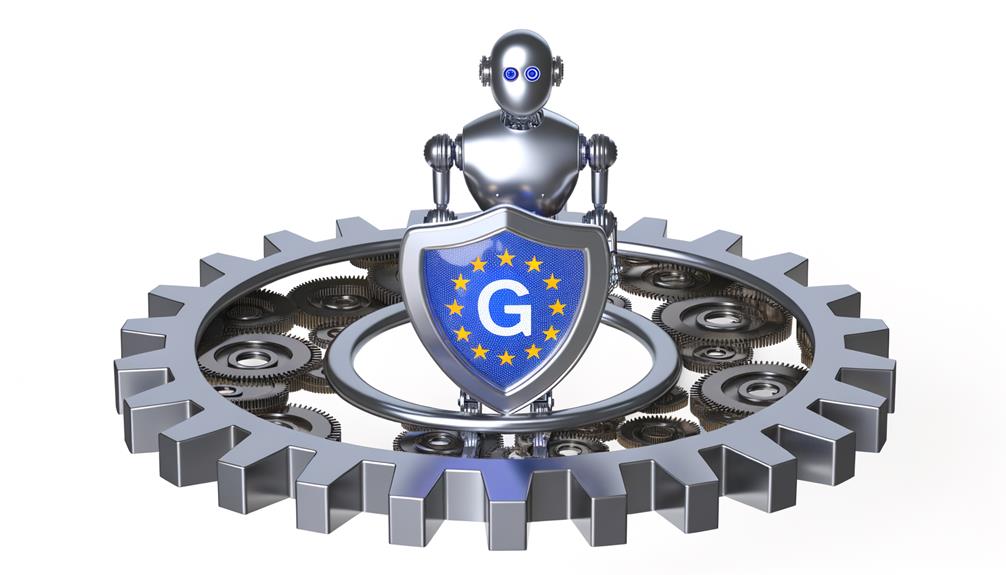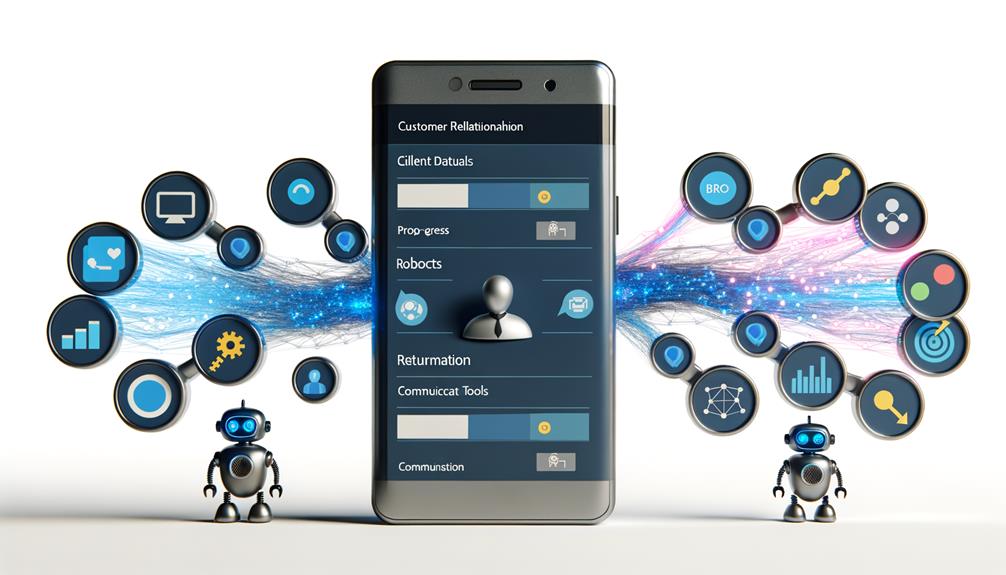As you navigate GDPR compliance in CRM, it's important to utilize AI. It auto-handles data processing tasks, classifies data, and assists in risk assessments, aligning well with GDPR principles. AI also enhances data security and optimizes operations. It's key to secure data through encryption, conduct regular audits, train your team on GDPR measures, and use AI to automate data anonymization. Top CRM solutions offer built-in GDPR features for easy compliance. Make the most of AI's predictive analytics for valuable customer insights and to personalize your engagement. There's more to explore on how AI and GDPR can revolutionize your CRM practices.
Understanding GDPR and CRM

To fully grasp your company's GDPR obligations in the context of CRM, it is vital to understand that this regulation dictates the lawful, fair, and transparent processing of customer data. This involves aligning CRM data management with GDPR principles such as purpose limitation and data minimization. These principles underscore the importance of not only limiting the scope of collected personal data but also ensuring its relevance and necessity. Privacy management here plays an important role as GDPR emphasizes customer rights, including the access, rectification, and erasure of their data stored in CRM databases. Therefore, GDPR compliance in CRM relies heavily on establishing a solid legal basis for data processing, and a robust system for managing data privacy. Understanding these obligations can help enhance your company's CRM data privacy while maintaining regulatory compliance.
AI's Role in GDPR Compliance

While you're working to align your CRM with GDPR's stringent guidelines, it's worth noting how AI can greatly streamline this process, helping guarantee compliance. AI's role in GDPR compliance is multi-faceted. To begin with, it assists in automating data processing tasks, ensuring efficient handling of personal data. Additionally, AI algorithms can identify and classify data within CRM systems, aiding in better data management and minimization, which is critical under GDPR. This minimization reduces unnecessary data collection and storage, aligning with GDPR directives. Thirdly, AI enhances data security measures by detecting and mitigating potential breaches in real-time. Finally, AI technology can aid in conducting privacy impact assessments, addressing potential risks to data subjects. Harnessing AI's capabilities can be a game-changer for GDPR compliance.
Best Practices for GDPR Compliance

When aiming for GDPR compliance in your CRM systems, it is vital to adhere to certain best practices, including the implementation of encryption and access controls to secure personal data. Regular audits and assessments guarantee your data processing aligns with GDPR mandates. Training employees on GDPR principles and data protection measures is also fundamental. These practices enhance compliance in AI-driven CRM systems. Additionally, AI features can automate data anonymization and pseudonymization, thereby ensuring compliance with GDPR standards. In addition, monitoring data processing activities through AI algorithms helps detect and proactively respond to GDPR violations. By diligently following these steps, you will not only ensure GDPR compliance but also foster trust among your customers, enhancing your business reputation.
GDPR-Compliant CRM Solutions

Exploring the landscape of GDPR-compliant CRM solutions can be intricate, but you'll find that several top-tier providers, such as Zoho CRM, Pipedrive CRM, Copper CRM, HubSpot CRM, and Salesforce Sales Cloud, offer robust features and tools to guarantee your compliance with these essential data protection regulations.
These CRM systems prioritize your customer's privacy and guarantee the secure handling of personal data. Here are some highlights:
- Zoho CRM's in-built GDPR features provide ease of compliance.
- Pipedrive CRM's customization options cater to international operations.
- Copper CRM's user-friendly features seamlessly integrate with Google products.
Improving CRM With AI

In your journey to enhance CRM efficiency, AI emerges as a transformative tool. By harnessing predictive analytics, AI can automate routine tasks, streamline processes, and offer invaluable insights to boost productivity. Additionally, the personalization that AI technologies bring to the table enables real-time, tailored interactions that redefine the customer experience.
AI Enhancing CRM Efficiency
Harnessing the power of AI can dramatically enhance the efficiency of your CRM, automating mundane tasks like data entry, lead scoring, and customer segmentation. This automation not only saves time but also guarantees the accuracy of your data. AI also secures GDPR compliance by safeguarding personal data, a critical aspect in today's data-driven world.
AI boosts CRM efficiency by:
- Streamlining processes: AI reduces manual errors, increasing productivity.
- Providing real-time support: AI-powered chatbots improve customer engagement and satisfaction.
- Offering personalized insights: Machine learning algorithms analyze customer behavior for personalized recommendations.
Predictive Analytics in CRM
Leveraging the power of AI, predictive analytics in CRM can revolutionize your marketing strategies by accurately forecasting customer behavior and trends. AI-powered CRM systems sift through vast amounts of data to predict customer preferences, greatly improving lead scoring and sales forecasting accuracy. With GDPR compliance in mind, these systems guarantee data privacy while making data-driven decisions. Machine learning algorithms identify patterns in customer data, enabling proactive decision-making. Predictive analytics not only enhances customer segmentation and targeting but also optimizes your resources, increases conversion rates, and elevates customer satisfaction. In a world where personalized marketing is key, employing AI-driven predictive analytics in your CRM strategy can give you a competitive edge.
Personalization via AI Technologies
Building on the power of predictive analytics, AI technologies take your CRM strategy a step further by honing in on personalization to provide tailored recommendations and experiences based on customer data analysis. With the integration of new features such as machine-learning algorithms, AI-driven CRM software can predict customer behavior, automate tasks, and deliver real-time insights.
- Privacy laws and GDPR compliance necessitate consent management and data retention strategies to guarantee the legitimate interest of processing personal data.
- Dynamic customer profiles, sentiment analysis, and predictive modeling are now possible, enhancing customer satisfaction.
- Automation of tasks like lead scoring and email campaigns optimizes efficiency and engagement.
These capabilities ensure you're not only meeting privacy requirements but also fostering personalized interactions with your customers.
Case Study: AI and GDPR in CRM

Let's now turn our attention to a case study examining the intersection of AI, GDPR, and CRM. You'll see how the implementation of AI in CRM can streamline data processing, while also complying with GDPR regulations. We'll analyze how organizations have successfully integrated privacy features, data encryption, and consent management tools into their CRM systems, all in the pursuit of GDPR compliance.
GDPR Impact on AI
To fully grasp the impact of GDPR on AI, it is crucial to understand that any integration of AI in CRM systems must closely adhere to these regulations to ensure ethical data processing and protect customer privacy. Incorporating AI in CRM can be a game changer, but you must be mindful of the implications of non-compliance.
- *GDPR mandates that AI algorithms be regulated*, to prevent discrimination, bias, and unauthorized data usage in CRM systems.
- *Transparency plays a crucial role*, as AI utilization in CRM necessitates clear accountability and data protection measures to align with GDPR.
- *Non-compliance can have significant consequences*, resulting in substantial fines and damage to reputation.
CRM Data Management Practices
Moving on from the impact of GDPR on AI, it's time to examine how AI enhances data management in CRM, while ensuring adherence to GDPR regulations. AI in CRM streamlines tasks such as data entry and analysis, generating customer insights with improved efficiency. This doesn't compromise GDPR compliance, as AI systems are designed to respect data protection regulations and protect personal data securely.
| AI in CRM | GDPR Compliance | Benefit |
|---|---|---|
| Automates data tasks | Adherence to regulations | Efficiency |
| Generates customer insights | Secures personal data | Privacy |
| Streamlines data processing | Maintains GDPR standards | Transparency |
AI-powered CRM tools also classify sensitive data, making GDPR compliance easier. The integration of AI with GDPR principles optimizes CRM data management, ensuring lawful processing and enhanced data security.



